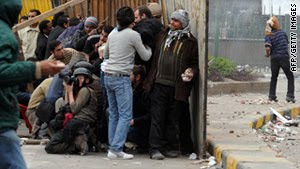Washington (CNN) -- President Barack Obama said Friday that talks between the Egyptian government and its political opponents were in the initial stages, but warned that the mere "pretense of reform" would not be enough to resolve that country's deepening crisis.
The transition of power "must begin now" and lead to "free and fair elections," he declared. Negotiations must "include a broad representation of the Egyptian opposition," he told reporters.
Asked if embattled President Hosni Mubarak needs to step down now -- as opposed to waiting for a successor to be chosen in Egypt's September elections -- Obama said Mubarak needs to consult with advisers and listen to what's "being voiced by the Egyptian people."
The Egyptian leader is "proud" but also a "patriot," Obama said. Mubarak needs to make a judgment about his legacy and the best "pathway forward." Violence and repression have no role in the "orderly transition process," he added. "The whole world is watching."
Obama noted he has had two conversations with Mubarak since the crisis began.
The U.S. government has encouraged talks between Mubarak's government and its opponents over the past few days, in part out of recognition that an orderly transition to democracy could prove difficult if Mubarak suddenly steps down without laying any groundwork first.
"We can't dictate what an orderly transition means, but it's time for both of them to roll up their sleeves," one senior State Department official said earlier Friday.
Members of the opposition, a disparate group of at least six factions and political groups nominally headed by Mohamed ElBaradei, are still "jockeying," the official said, hedging their bets on how events will play out, and some are refusing to negotiate unless and until Mubarak steps down.
The official said the administration believes Mubarak's vice president -- Omar Suleiman -- is sincere in his willingness to talk with the opposition, although talks are still in the initial stages.
U.S. lawmakers chimed in Thursday, with foreign policy veterans Sens. John Kerry, D-Massachusetts, and John McCain, R-Arizona, among those calling for Mubarak to step aside.
Thursday night, the U.S. Senate gave unanimous approval to a resolution calling for Mubarak to "immediately begin an orderly and peaceful transition to a democratic political system, including the transfer of power to an inclusive interim caretaker government, in coordination with leaders from Egypt's opposition, civil society, and military, to enact the necessary reforms to hold free, fair, and internationally credible elections this year."
Obama and Secretary of State Hillary Clinton, meanwhile, have condemned a string of attacks against journalists, human rights activists, and protesters in Egypt.
The United States continues "to be crystal clear that we oppose violence as a response to this crisis," Obama said Friday. On Thursday, Clinton called such incidents "a violation of international norms" and "unacceptable in any circumstances."
"It is especially in times of crisis that governments must demonstrate their adherence to (core universal) values," she said.
White House Press Secretary Robert Gibbs said Friday that the administration continues "to receive very disturbing reports" of "systematic targeting" of journalists in Egypt.
The increasingly urgent push for reform comes as the Egyptian government pushed back on what it called "vague" statements from the Obama administration about the pace of transition.
One Egyptian government official told CNN the United States has shown support for its "road map" for transitioning to democracy by the end of Mubarak's term in September, but said Obama's call for an "orderly transition" are at odds with his call for an immediate one.
The official said Mubarak is seen as a "receding figure" in Egyptian politics, but deposing him immediately would lead to a murky political process, which would prevent the free and fair elections the protesters are calling for. According to the Egyptian constitution, the presidency would be transferred to the speaker of the parliament if Mubarak leaves power without enacting certain legislative and constitutional reforms.
"Institutionally, there is support in Egypt for this road map among the military, vice president and prime minister," the official said. "The bureaucracy thinks it has a degree of legitimacy and if the objective continues to be deposing the president now, they clearly don't understand the advantage that this road map will create a constitutional and administrative voice to the transition and is not going to lead to confusion."
U.S. officials describe an opposition that is not altogether unified on whether to begin a dialogue with the government. Some, like former foreign minster and Arab League Secretary General Amre Moussa, said concessions made by Mubarak present an opportunity to build upon. Members of the Muslim Brotherhood had said that no talks should take place until Mubarak steps down.
"There are some people who see what is required to hold the type of elections they want to hold. They are looking at the administrative questions that have to be answered, and realize that will take a bit of time," the senior State Department official said. "They are focusing on elections and transformation of the system, rather than on Mubarak."
The Egyptian official said conversations with Washington suggest the United States understands this process, but public statements from Obama, Clinton, and U.S. government spokesmen have sent mixed messages.
"We understand the need to be vague and play to the street, but this is hardly the time," the official said.
The United States continues to reach out to every country in the Middle East, not only to solicit their analysis and advice, but also to assure nervous allies that the United States stands with them during this tumultuous time in the region, the official said.
"We are in a phase where the Mubarak era is ending in Egypt, either now or in September, and something this significant hasn't happened in the region in some time," the official said. "We are giving them the chance to give us their views and letting them know how significant this is."
Job Opening – Accounts and Finance Officer
1 week ago













0 comments:
Post a Comment